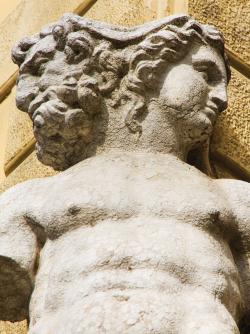The “Venerable” Robert Schuman
What does the founding of the European Union—and its architects—have to do with Bible prophecy?
Robert Schuman (1886–1963) was a French statesman who dedicated his entire adult life to politics. He served in France’s parliament from 1919–1962 as a deputy representing the Moselle region. In the years after World War II, he served under French President Vincent Auriol as Foreign Minister and President of the Council of Ministers.
But, above all, it is Schuman’s commitment to Europe that has preserved his name for posterity. He is considered one of the “fathers of Europe” alongside such notables as Konrad Adenauer, Alcide de Gasperi, Paul-Henri Spaak, and Jean Monnet. Specifically, his “Schuman Declaration” of May 9, 1950, led to the establishment of the European Coal and Steel Community, uniting the economic interests of France and West Germany—and, soon afterward, Italy and the three Benelux nations—and setting the stage for the Treaty of Rome in 1957, which marked the founding of the European Economic Community, predecessor of today’s European Union.
Schuman’s European Idea
In the difficult years after World War II, Schuman perceived the need for a Western European political and financial organization—not only to prevent future wars in Europe, but also to prepare for the future as Europe began to feel the effects of the Cold War being waged between the United States and the Soviet Union.
As a member of France’s MRP (Popular Republican Movement)—a centrist, Christian Democrat, and Europhile political party—Schuman saw Europe as a spiritual and cultural community grounded in its Roman Catholic heritage, and in the democracy he felt was born out of that heritage. Historian Georges-Henri Soutou summed up Schuman’s perspective on European civilization:
For Schuman, in fact, this Europe was defined in its deep nature by its history and its civilization, but its effective political construction presupposed a common will respecting the framework of democratic values…. Europe was based on a unity of civilization, on a history shared and henceforth reconciled, and on common values (including democracy, freedom and the rule of law)…. We had here a clearly defined Europe, which was certainly based on universal values (or which claim to be such) such as democracy and human rights but which clearly affirmed its specificity as a geographical, historical and civilizing space (Outre-Terre, vol. 7, n. 2, 2004, pp. 36–37).
A Modern Roman Empire?
Schuman, who also served as President of the European Parliament from 1958–1960, looked to European history as the foundation of its present and future. Indeed, over the centuries, certain parallels become readily evident. A desire for the federation of smaller states evokes Europeans’ fond memories of the Roman Empire at its best, yet the worst of Rome’s repression and tyranny emerges in the practice of such a federation. Nominal Christianity—really, Roman Catholicism in particular—is held up as grounds for a common culture, yet in practice we find pre-Christian paganism crowding out the truths Christ taught and practiced.
We should not underestimate the importance of the ongoing connections drawn between the Roman Empire and the European Union. In an article titled “From the Roman Empire to the United States of Europe: The European dream in seven chapters,” the newspaper Luxemburger Wort strikingly examines the examples of Charlemagne, Charles V, Napoleon I, and Hitler (March 23, 2017)—men whom Bible students will recognize as leaders of previous revivals of the ancient Roman Empire. These revivals were foretold long ago by the Apostle John in a striking passage of the book of Revelation (Revelation 17:1–10). Though most historians and journalists do not take the Bible seriously as a source of history and prophecy, it is remarkable to see how their secular conclusions parallel biblical prophecy!
But just how important is Roman Catholic interest in Europe’s future? We have seen Europe’s connection to the old Roman Empire, but even as France and much of the rest of Europe believes less and less in God—particularly the God of the Bible—the historical and cultural heritage of Roman Catholicism seems to come to the forefront for its ability to impose a shared civilization, history, and value system on the varied peoples of Europe. Scripture warns of a coming political system that will appear peaceful, like a lamb, yet will deceive millions into following a political figure known as the “beast,” who will carry out Satan’s evil will (Revelation 13:11–15). So, can we expect to see Roman Catholicism play an important role in unifying Europe?
Saint Schuman?
Author Cédric Burgun wrote that European unifier “Schuman was a layman who worked with all his might to sanctify his time and the society in which he lived…. He saw the two world wars, knew how to be prophetic and tried to make his political mission coincide with the words of the Gospels: the forgiveness of enemies” (La Croix, June 19, 2021).
So, can the political unity of Europe be tied to its religious sanctity and even to the “gospel” message? Most of the mainstream media ignored an important event that occurred on June 19, 2021, when Pope Francis approved a Vatican report proclaiming Schuman’s “heroic virtues” as a Roman Catholic layman. Francis’ approval gives Schuman the title “Venerable” among the Roman Catholic faithful and sets him on the path to “sainthood” in his church. To learn the actual scriptural identity of “saints,” you can read our March 2021 article “Saints and Nations.”
A Religiopolitical Union?
Is it significant that one of the prime movers behind a unified Europe is also revered for his Roman Catholic virtues? When we look at the lessons of history, we are reminded that the Roman church has long sought to influence European civilization, socially and politically as well as religiously. Historian Michel Meyer has reflected:
So, what was it that kept Rome and its peoples together for so long [approximately 1,000 years from the Republic to the end of the Empire], and imposed its values until they were transmitted to us? [Pagan, then Catholic] religion was above all a matter of rites more than of beliefs, hence the formalism that we will find even in Roman law, which is still the basis of ours…. Europe will only recover thanks to the [Roman] Church which, after only several centuries, will take over (Qu’est-ce que l’Histoire? Progrès ou déclin?, 2013, pp. 64–65).
In a world where religious division is creating more and more new varieties of “Christianity” with varying beliefs and practices, Meyer’s insight is significant. By offering common rites that can bring people into unity despite differing local customs and beliefs, Roman Catholicism provides a powerful tool for achieving and maintaining Europe as a single cohesive entity with its own unique identity. But that identity will become a dangerous reality, guided by a religious figure Scripture describes as a “great harlot” whose corrupt teachings will unify Europe under the rule of the prophesied beast (Revelation 17:1–4).
Robert Schuman is perhaps the most striking human emblem of Europe’s envisioned unity, equally “venerable” to the continent’s Roman Catholics and to political forces seeking a Europe united religiously and sociopolitically. And, on the foundation he helped to set, biblical prophecy regarding Europe and its future is continuing to come alive. Keep reading your Bible, and keep reading Tomorrow’s World, so you will be prepared as millennia-old prophecies are fulfilled all around you.






